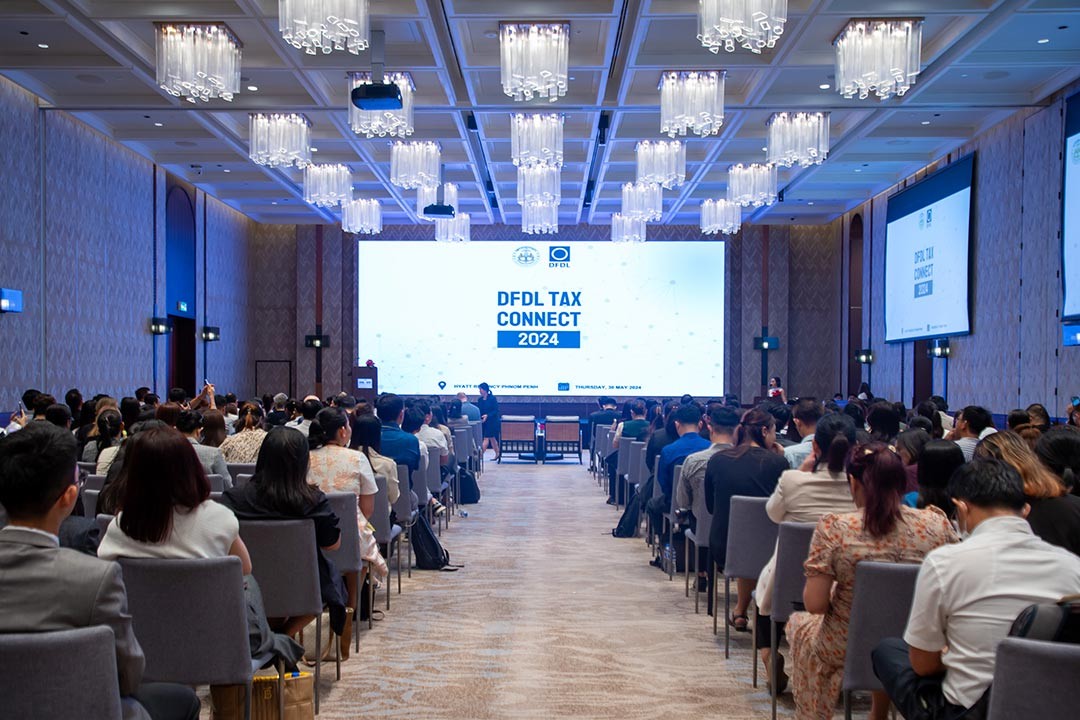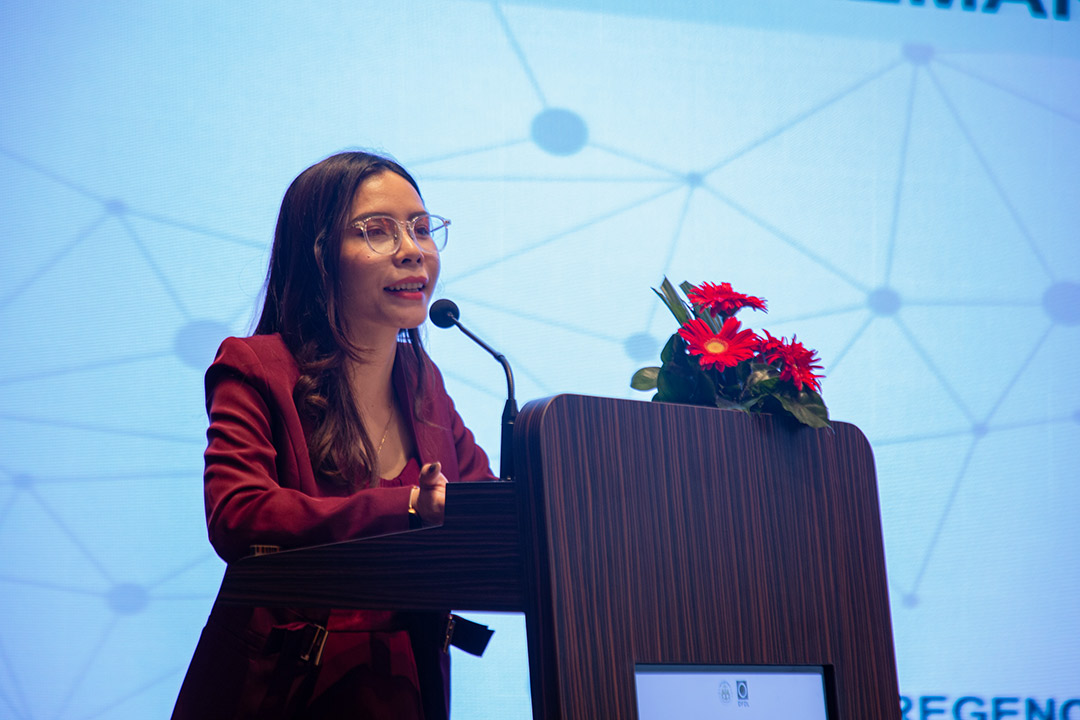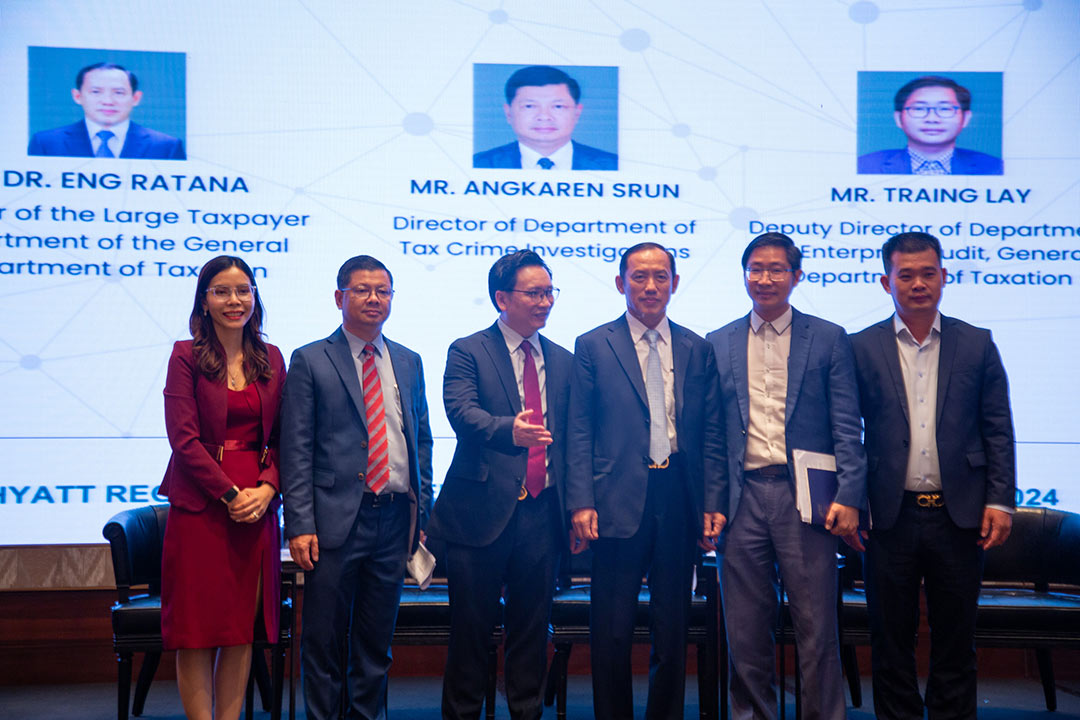DFDL ‘Tax Connect 2024’ Shares Latest Updates In Cambodia’s Tax Landscape

DFDL Cambodia organised ‘Tax Connect 2024’ on May 30 at the Hyatt Regency Phnom Penh, with representatives from the General Department of Taxation (GDT) invited as guest speakers, and more than 300 participants in attendance.
‘Tax Connect 2024’ was organised to provide the latest updates on recent tax regulations, including updates on tax practices for transfer pricing and the new Standard Operating Procedure (SOP) for Tax Audit and SOP on Tax Crime Investigation, released by the GDT in consultation with the private sector.
Updates From Cambodia’s General Department Of Taxation
H.E. Bun Neary, Deputy Director General of the GDT, delivered a keynote address where she spoke of the work the GDT has been doing to revise relevant legal documents (including sub-decrees, proclamations and instructions) in order to make them consistent with the Law on Taxation (2023) and to ensure they are clear and easy to implement.
She shared that the GDT has prepared 31 legal documents, with 11 implemented so far and six in the process of approval. The remaining draft legal documents are in the final stages of discussion.
She also gave updates on the Government’s efforts to expand its network of Double Taxation Agreements (DTAs). Cambodia currently has DTA agreements with 11 jurisdictions (Singapore, Thailand, China, Brunei, Viet Nam, Hong Kong SAR, Indonesia, Malaysia, Republic of Korea, Macau SAR and Turkey), has concluded negotiations with Laos PDR and the Philippines (with the documents awaiting signing), and is currently in the process of negotiating DTAs with five other countries (Myanmar, United Arab Emirates, Japan, Morocco and France).

Recent Tax Updates In Cambodia – 2024
Vajiravann Chamnan, Tax Director at DFDL Cambodia, delivered a presentation summarising the latest tax updates on the Sub-Decrees, Prakas, Instructions and Notifications which were introduced from the early of 2024.
She highlighted the key changes of the VAT Sub-decree and the Prakas on Public Lighting Tax, tax incentives for the tourism sector, tax incentive for the establishment of educational institutions, and other updates, comparing between old and new regulations.
Other tax updates she mentioned included:
- Tax amnesty under Prakas 071 on Tax Incentives for Voluntary Amendment of Tax Returns, in which the tax incentive period will be due by the end of June 2024;
- DTA benefit approval under Instruction 180;
- The launch of the GDT E-Administration system, allowing taxpayers more convenience when submitting various applications online;
- Key points on Minimum Tax exemption for QIP enterprises;
- Instruction 18412 on the implementation of tax incentives for Micro, Small and Medium (MSMEs) enterprises for informal economic development;
- The extension of the implementation of Capital Gain Tax until the end of 2024, defined under Notification 001 MEF.BrK.GD.
Update On The Work Permit Requirement For Foreign Business Owners In Cambodia 2024
Another update that Vajiravann drew attention to was Instruction 110/23, which was issued in December 2023, on the Provision of Foreign Work Permits for Foreign National Employers.
The instruction specifies that foreign national employers whose name appears on the patent tax certificate of a Cambodian enterprise must have a valid work permit, regardless of whether they work in Cambodia or not.
The penalties for failing to obtain a valid work permit include:
- Fine of up to KHR 12.6 million (approximately USD $3,150) per employee by the Ministry of Labour and Vocational Training (MLVT), capped at KHR 63 million (approximately USD $15,750).
- Imprisonment from six days to one month and, in the case of repeat offences, from one to three months.

New Standard Operating Procedures For Tax Audit and Tax Crime Investigation In Cambodia
Chuor Se, Deputy Director of the Department of Enterprise Audit under the GDT, clarified that the new SOP on Tax Audit aims to further clarify and reinforce the spirit of Prakas 270, which is intended to streamline the tax audit process. The SOP was prepared to be used as a guide for both tax auditors and taxpayers under the self-assessment system.
The SOP breaks down the types of audits and their rules and procedures; the rights, authority and obligations of taxpayers and the tax administration in the tax audit process; the code of conduct that auditors and taxpayers must abide by, including the standards of professionalism and discipline; and the reporting and complaint mechanism that taxpayers can pursue.
The SOP on Tax Crime Investigation – which was presented on by Angkaren Srun, Director of the Department of Tax Crime Investigations under the GDT – similarly acts as a guide for both tax officers and taxpayers on:
- The process of investigating tax crimes;
- The scope, methodology, procedures and penalties involved;
- The rights, authority and obligations of taxpayers and tax officials, as well as competence and accreditation of the tax administration;
- The code of conduct on ethics, discipline and professionalism in the tax crime investigation process;
- The monitoring, inspection and evaluation mechanisms;
- The reporting and complaint mechanisms.

Tax Connect 2024 concluded with a panel discussion between the GDT officials and DFDL representatives, as well as a Q&A session where audience members had a chance to ask questions about the topics covered.